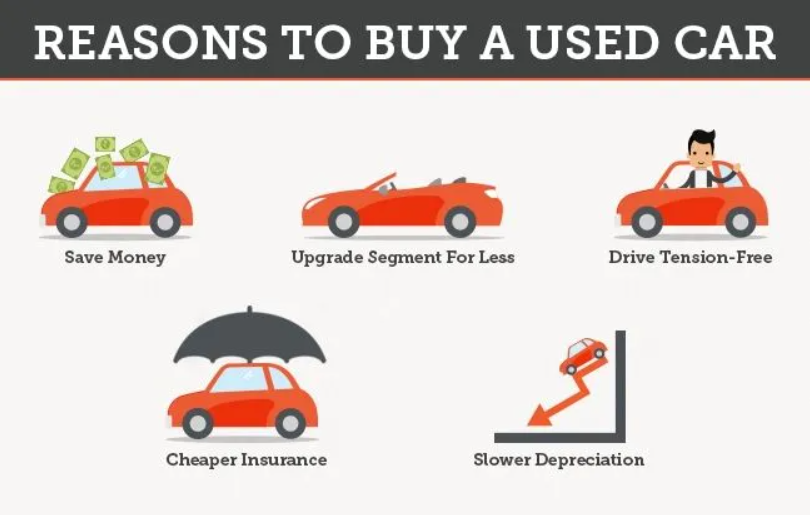Purchasing a used car can be a smart financial decision, allowing you to save money while still obtaining a reliable vehicle. However, the process can be daunting if you are not well-prepared. To help you navigate this experience successfully, here are four crucial steps you must take when buying a used car.

1. Research the Vehicle
Understand Your Needs
Before diving into the buying process, take some time to consider what you need from a vehicle. Think about factors such as:
- Size: Do you need a compact car for city driving, or do you require a larger vehicle for family needs?
- Fuel Efficiency: How important is gas mileage to you? Fuel-efficient vehicles can save you money in the long run.
- Features: Consider must-have features, such as safety technology, entertainment systems, and storage capacity.
Explore Market Options
Once you have a clear idea of what you need, start researching different makes and models that fit your criteria. Use online resources like consumer reports, automotive websites, and forums to gather information about:
- Reliability: Look for cars known for their reliability and low maintenance costs.
- Resale Value: Some brands and models hold their value better than others. Consider cars that have a good resale value to protect your investment.
- Recalls and Reviews: Check for any recalls on the vehicle models you are considering and read reviews from other owners to understand their experiences.
Price Comparison
Investigate the market prices for the specific models you’re interested in. Websites like Kelley Blue Book, Edmunds, and Autotrader can provide you with a fair market range. This research will empower you to negotiate better when you find a vehicle you like.
2. Inspect the Vehicle Thoroughly
Visual Inspection
When you find a used car you’re interested in, conduct a thorough visual inspection. Check for signs of:
- Body Damage: Look for dents, scratches, and rust that might indicate a history of accidents.
- Tires: Inspect tire tread depth and wear patterns. Uneven wear may signal alignment issues or suspension problems.
- Fluids: Check oil, coolant, and other fluid levels. Dark or contaminated fluids may indicate poor maintenance.
Mechanical Inspection
It’s crucial to assess the mechanical condition of the car. While you can do some initial checks, consider having a professional mechanic conduct a pre-purchase inspection. They can identify hidden issues such as:
- Engine Condition: A mechanic can check for leaks, unusual noises, and overall engine performance.
- Brakes and Suspension: Ensuring these components are in good shape is vital for safety and handling.
- Transmission and Electrical Systems: These can be costly to repair if problems exist, so a thorough check is advisable.
Test Drive
Always take the car for a test drive. Pay attention to:
- Comfort: Ensure you feel comfortable and have a clear view.
- Handling: Notice how the car responds to turns and brakes.
- Noise: Listen for unusual sounds, such as grinding or rattling, that could indicate issues.
3. Review the Vehicle History Report
Importance of a History Report
A vehicle history report provides crucial information about the car’s past, including:
- Accident History: Knowing if the car has been in any accidents can help you assess potential future issues.
- Title Status: Ensure the title is clean and not branded as salvage or rebuilt, which can affect resale value.
- Mileage Verification: A report can help verify the accuracy of the odometer reading, guarding against odometer fraud.
Where to Obtain Reports
You can obtain vehicle history reports from services like Carfax or AutoCheck. Usually, you can get a report using the Vehicle Identification Number (VIN). It’s a small investment that can save you from making a costly mistake.
4. Negotiate the Price and Understand Financing
Negotiation Tips
Once you have done your research, inspected the vehicle, and reviewed its history, it’s time to negotiate. Here are some tips:
- Start Low: Begin with a lower offer based on your research but remain reasonable. This gives you room to negotiate upward.
- Use Your Findings: Leverage any issues you discovered during your inspection or in the vehicle history report to justify your offer.
- Be Prepared to Walk Away: If negotiations do not meet your expectations, be ready to walk away. There are plenty of used cars available, and it’s essential to find one that meets your needs and budget.
Understanding Financing Options
If you need financing to purchase the car, explore your options carefully:
- Bank or Credit Union Loans: Often offer lower interest rates compared to dealership financing. It’s worth shopping around for the best rates.
- Dealership Financing: Some dealerships offer financing, but always compare rates to ensure you’re getting a fair deal.
- Loan Terms: Understand the terms of the loan, including interest rates, monthly payments, and the total cost over the loan period. Aim for the shortest term you can afford to minimize interest payments.
Conclusion
Buying a used car can be a rewarding experience when you approach it with careful planning and knowledge. By following these four essential steps—conducting thorough research, inspecting the vehicle, reviewing its history report, and negotiating the price—you can make an informed decision that ensures you get a reliable vehicle at a fair price. Remember, taking the time to prepare and educate yourself will ultimately lead to a more satisfying and successful purchase. Happy car shopping!








